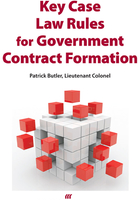
4. REPROCUREMENT CONTRACT DID NOT SEEK COMPETITION 
Overview of This Protest Ground: Following a termination for default, the contracting officer has wide discretion in conducting the reprocurement for the same item or service. Protests in this area are lodged by either (1) the defaulted contractor or (2) companies (other than the defaulted contractor) arguing that they are being unfairly excluded from the reprocurement. Regarding the first category, the answer is clear: the GAO will not review an agency’s decision not to solicit a defaulted contractor in the reprocurement of work remaining under the defaulted contract. However, because the FAR requires the contracting officer to seek competition “to the maximum extent possible,” the GAO will review an agency’s decision to exclude other offerors under a “reasonableness” standard.
GAO’s Key Language
Generally, the statutes and regulations governing federal procurements are not strictly applicable to reprocurements of defaulted requirements. In particular, under the standard termination for default clause incorporated into GPO solicitations and contracts, the contracting officer may reprocure “under the terms and in the manner the Contracting Officer considers appropriate” for the repurchase. We will review a reprocurement to determine whether the agency acted reasonably under the circumstances…. Further, our Office has specifically held that an agency may properly exclude a defaulted contractor from a reprocurement for the remaining work in the defaulted contract… (“although ‘competition to the maximum extent practicable’ must be obtained in the reprocurement, that standard does not, in our view, mean that an agency must consider an offer from a defaulted contractor for the reprocurement of the very work for which it was defaulted”). This view is consistent with various Board of Contract Appeals decisions reviewing agency’s default terminations, which have long held that the contracting officer’s broad discretion in conducting reprocurements includes the discretion to exclude the defaulted contractor from the repurchase. This reasoning applies despite the fact that the protester has appealed the default termination to a Board of Contract Appeals.
Colonial Press International, Inc., B-403632, Oct. 18, 2010.
Citing our decision in Montage Inc., B-277923, B-277923.2, Dec. 29, 1997, 97-2 CPD ¶ 176, the agency first argues that we should dismiss the protest. In Montage, we reexamined our previous view that a defaulted contractor may not be automatically excluded from a competition for the defaulted requirement because such an exclusion would constitute an improper premature determination of nonresponsibility. In recognition of the broad authority to reprocure accorded the contracting officer by Federal Acquisition Regulation (FAR) § 49.402-6, we adopted the position that we would decline to review an agency’s decision not to solicit a defaulted contractor in the reprocurement of work remaining under the defaulted contract. The agency argues that the Montage decision should control here because [the protester], although not the defaulted contractor in connection with the anti-gravity suits being reprocured, was recently terminated for default for failure to timely present first article test (FAT) samples and make deliveries under other contracts for anti-gravity suits.
We decline to extend the decision in Montage beyond the situation presented in that case, and again more recently in Essan Metallix Corp., B-310357, Dec. 7, 2007, 2008 CPD ¶ 5, wherein a contractor protests its exclusion from a reprocurement necessitated by the termination of its own contract. As that is not the situation presented here, we will review whether the agency’s decision to exclude [the protester] was reasonable.
Generally, the statutes and regulations governing federal procurements are not strictly applicable to reprocurements of defaulted requirements. Rather, under FAR §§ 49.402-6(a), (b), and 52.249-8, an agency may use any terms and acquisition method deemed appropriate for repurchase of not more than the undelivered quantity for which the contract was terminated, although an agency must obtain competition to the maximum extent practicable and as reasonable a price as practicable. These FAR provisions allow the agency to purchase the needed supplies as expeditiously as possible while preserving the government’s right to seek excess reprocurement costs from the defaulted contractor. Id.
Derm-Buro, Inc., B-400558, Dec. 11, 2008.
[In light of FAR 49.402-6(b)], contracting officers are invested with wide latitude to determine how needed supplies or services are to be reprocured after the default of a contract. In the absence of a countervailing law or regulation, such a broad grant of discretion necessarily includes determining, in view of the circumstances of the default, whether or not to solicit or allow the defaulted contractor to compete in the reprocurement. The agency, with its particularized knowledge of the contractor’s past performance (or failure to perform) on the requirement being reprocured, is clearly in the best position to make that determination. Although “competition to the maximum extent practicable” must be obtained in the reprocurement, that standard does not, in our view, mean that an agency must consider an offer from a defaulted contractor for the reprocurement of the very work for which it was defaulted. Accordingly, and in light of the broad authority accorded contracting officers by FAR § 49.402-6, we will not review an agency’s decision not to solicit a defaulted contractor.
Montage, Inc., B-277923.2, Dec. 29, 1997.
FAR Crosswalk: FAR §§ 49.402-6 and 52.249-8.
Other Relevant Cases: See page 291 in the Index of Representative Cases.
Commentary: This is a straightforward protest ground as applied to the defaulted contractor. However, a contracting officer must be careful with regard to maximizing competition for the reprocurement. After all, terminations for default are inherently disruptive. If they are followed by a protest of the reprocurement by a company seeking to compete, the government will likely encounter further delays while the protest is resolved. There is no simple solution; the contracting officer must use his or her best judgment in designing the reprocurement to ensure that it meets the “competition to the maximum extent practicable” standard and ensuring that these decisions are documented.